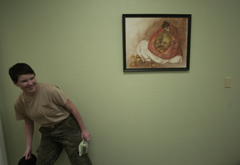
Esperanza Center targets Spanish speakers and transitional-age
children
Though it is 2007 there are still quite a few people who connect
a negative stigma with seeking psychological help, according to
Alan Yamamoto, the director of the San Benito County Behavioral
Health Department.
Esperanza Center targets Spanish speakers and transitional-age children
Though it is 2007 there are still quite a few people who connect a negative stigma with seeking psychological help, according to Alan Yamamoto, the director of the San Benito County Behavioral Health Department.
Organizers of the recently opened Esperanza House in Hollister are hopeful that some non-traditional settings and a friendly, inviting downtown location will help their clinic connect with some of the people who have been more hesitant in getting mental help.
From the outside, the Esperanza house, which means, “Hope” in Spanish, looks like a youth center. With tables set up around the room, exercise equipment in one corner and an assortment of board games covering some of the tables; the quintessential ping-pong table taking a place in the center of the room. One would never guess this is a place for getting psychological help, but that’s the way the organizers like it.
“We didn’t want a traditional-looking clinic,” Yamamoto. “Transition-age kids [those 16-25] who come from group homes traditionally fall through the cracks because there is no one there to care for them. They often end up on the streets or in jail. We wanted a way to reach this population and a sterile office setting didn’t seem like a good way to attract this population.”
In addition to serving transition-age people the clinic is also aimed at adults between the ages of 18-62 who have previously been overlooked due to language problems.
Often when a person doesn’t speak English, it is difficult to find a mental health specialist who is bilingual. In the past in San Benito County translators have had to be present during sessions to communicate back and forth between patient and doctor.
However, with the introduction of the clinic’s new telemedicine program, clients can relate to doctors in their own language.
“It really increases accessibility,” Yamamoto said. “Children find it easier to relate to the advanced technology and some of our patients with psychotic disorders find more comfort in the modality of it.”
Through the program, clients have remote-access sessions with a psychiatrist located in Fresno.
On any given Friday patients come in to the clinic and the caseworker already has the device set up. It looks like a giant video camera attached to the television set. The client sits in the center of the room and at the other end of the television is the doctor.
“Typically sessions start with an assessment so that the doctor understands the needs, if they are on any medications and any side-effects they may be experiencing. Later, the client comes back for a follow-up session,” Yamamoto said.
Assessments are delivered in real time, according to Yamamoto, so there is little or no waiting and prescriptions can be faxed over to the Esperanza house almost immediately. Charts can be done the same way.
“You can see that clients are visibly relieved when they can communicate with their doctor in their own language,” Yamamoto said.
The other thing that differentiates the Esperanza house from other mental health facilities is that it also contains a full working kitchen and a washer and dryer. Since many of the clients coming to the Esperanza house have come from transitional backgrounds many don’t have the same life skills that other people their age possess. The clinic offers groups on making and keeping friends, domestic violence, cooking, music and art.
The hours during which the Esperanza House will operate are still being worked out, but the facility is located at 327 Fifth Street. Their telephone number is 636-4020.








